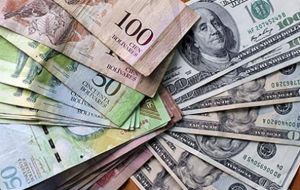MercoPress. South Atlantic News Agency
Venezuela desperate after US dollars; greenback costs 228.000 Bolivars in the black market
 The central bank said the first auction of its new DICOM system yielded an exchange rate of 30,987.5 bolivars per euro, equivalent to around 25,000 per dollar.
The central bank said the first auction of its new DICOM system yielded an exchange rate of 30,987.5 bolivars per euro, equivalent to around 25,000 per dollar.  The new rate is still dwarfed by the black market rate for greenbacks, currently at 228,000 bolivars per dollar according to website DolarToday
The new rate is still dwarfed by the black market rate for greenbacks, currently at 228,000 bolivars per dollar according to website DolarToday Venezuela’s central bank announced a devaluation of more than 99% of its official exchange rate with the launch of a new foreign exchange platform, a move critics quickly said would not create a functioning currency market.
The central bank said the first auction of its new DICOM system yielded an exchange rate of 30,987.5 bolivars per euro, equivalent to around 25,000 per dollar.
That is a devaluation of 86.6% with respect to the previous DICOM rate and 99.6% from the subsidized rate of 10 bolivars per dollar, which was eliminated last week.
Venezuela is undergoing a major crisis, with quadruple-digit inflation and shortages of food and medicine. Economists consistently describe the 15-year-old currency control system as the principal obstacle to functioning commerce and industry.
The new rate is still dwarfed by the black market rate for greenbacks, currently at 228,000 bolivars per dollar according to website DolarToday, which is used as a reference.
The existence of such disparate exchange rates has for years encouraged Venezuelans to buy dollars on the cheap and flip them on the black market for a profit. That has created shortages of hard currency, which in turn fuels shortages of imported products such as food and medicine.
The government has repeatedly created foreign exchange mechanisms similar to DICOM, but business leaders say they never provided a steady supply of hard currency.
The government would repeatedly end up shuttering the foreign exchange platforms in part because maintaining an exchange rate so divergent from the black market rate proved to be unsustainable.
“If the exchange rate is imposed arbitrarily, it will perpetuate the crisis,” wrote Alejandro Grisanti of local consultancy Ecoanalitica on Twit.




Top Comments
Disclaimer & comment rulesCommenting for this story is now closed.
If you have a Facebook account, become a fan and comment on our Facebook Page!